G/L Trigger AR Reallocation Tutorial
Recover Equipment Lease paid on behalf of another company
When a company pays an expense against a specific account it needs to raise an A/R Entry to transfer the expense to a second company. In this instance there is no loan account balancing. This is done using G/L Trigger A/R Reallocation and only happens within the same company.
Requirement! This uses Inter-Entity Transactions Trigger functionality. It is available in Inter-Entity Transactions Single Company and Multi-database, but A/R Reallocation only works within the same Sage 300 company.
Example: A/P Invoice entered for equipment lease paid in Entity 1 (ORCLTD). A portion of the lease payment is due from Entity 2 and Entity 4. Inter-Entity Trigger will raise the A/R Invoice for Entity 2 and Entity 4. The Entity (Customer) is selected in an optional field on the invoice.
Scenario
The entry we want to process
| 7261-1 Equipment lease expense Entity 1 | ||||||
|
| 7264-1 Equipment lease expense Entity 2 & 4 | ||||||||||||
|
| Accounts Payable Control Account (Entity 1) | ||||||
|
Inter-Entity Triggers will create the AR Invoice for Customer 9992 and 9994(Entry 1)
| Accounts Receivable Control Account | |||||||||||||
|
General Ledger Setup
This has been done in the ORCLTD database in Orchid Sample data.
Create a G/L segment to define the entity
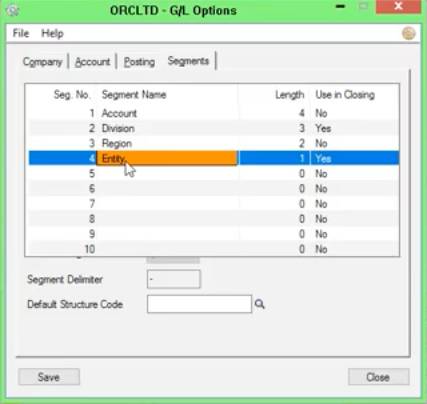
Setting up the entities in G/L > Segment Codes
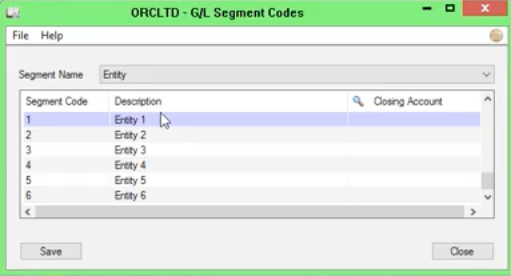
Set up the expense and control accounts in G/L
In the source company, create the following accounts (ORCLTD in the example below)
Accounts payable control account Entity 1
7264-1 Equipment lease recoverable, Entity 1
The A/P Control account for the Vendor used for the recording of the expense must belong to the same entity as the G/L Trigger account, in this example, Entity 1.
The A/R Control account for the customer representing the entity to recover expense from must also belong to the same entity as the G/L Trigger account.
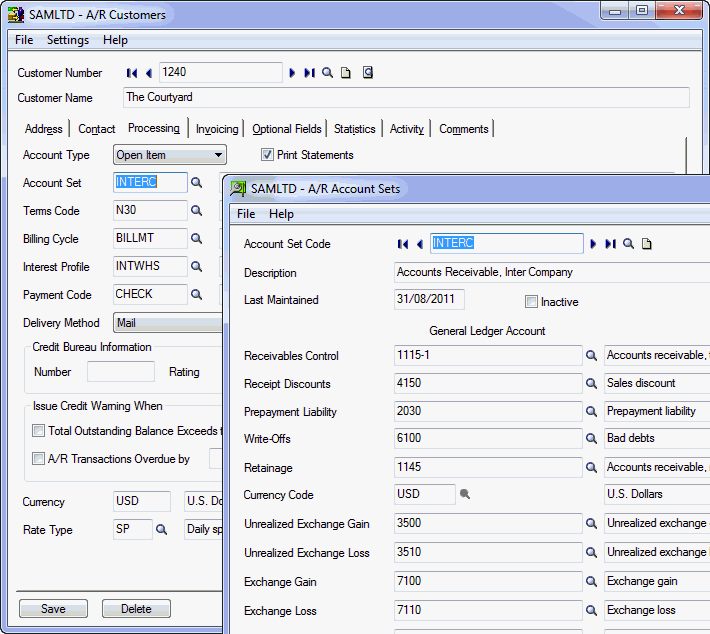
Set up the source codes in G/L
In this tutorial, AP-IT will be used for transactions generated by IET Triggers.
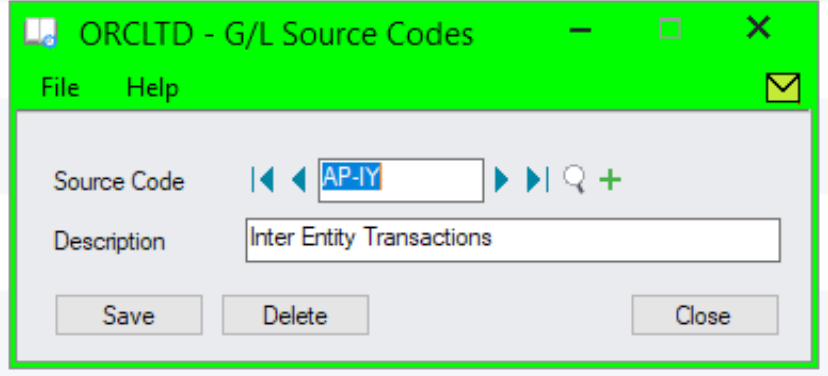
Setup Optional Field to define the customer to invoice
In this example, the customer will be set through an optional field when entering the A/P Invoice.
Setup an optional field called SUBSTCUST and assign it to A/P Invoice detail and G/L Transaction details.
Inter-Entity Options Setup
For details on each option, refer to the detailed screen guide. Inter-Entity Options Screen Guide and Field List.
Define the Entity segment/s to be used by Inter-Entity
In this tutorial, the Entity segment is segment 4 and Entity 1 is the default entity.
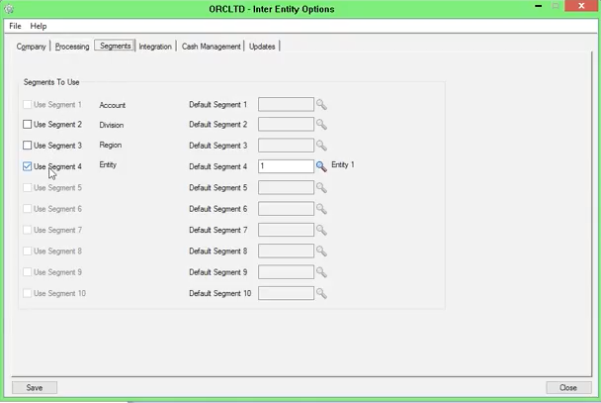
Inter-Entity Options > Processing Tab
You need to select "Use Inter-Entity Processing" and "Use IET Triggers".
Select the required options for A/R Reallocation . In this example, we will auto-post the A/R Batch and select the customer/entity in an optional field.
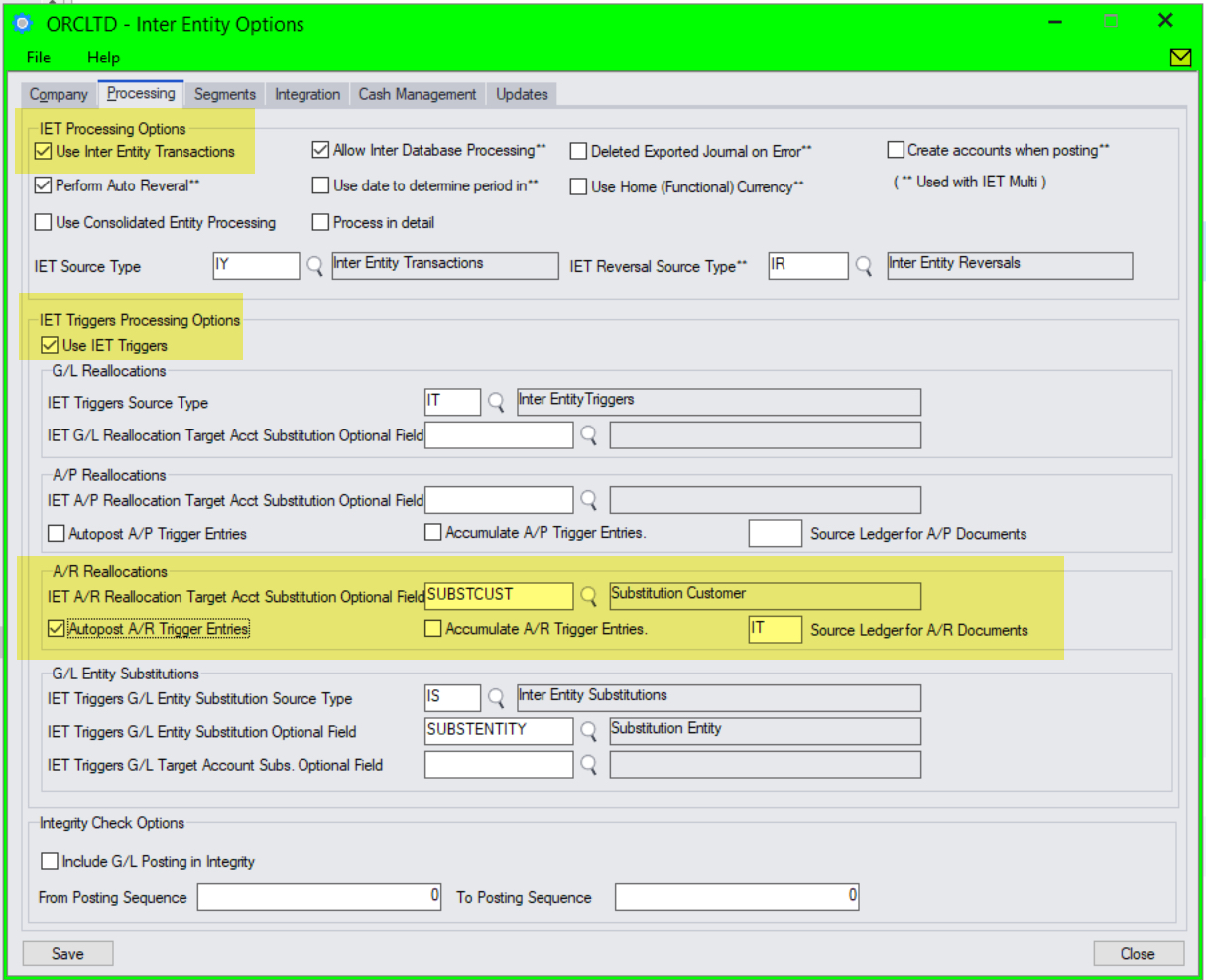
Setup G/L Trigger Account
In this example, we will select the entity / customer target account in an optional field when entering the source AP Invoice. So you configure "Yes" to "Is Account Substitutable", provide the optional field name (SUBSTCUST) that will be used to enter the Customer Account. This Optional field needs to be captured in the source entry, and then flowed through to the General Ledger at a transaction level.
Note: If you always re-allocate balances in the G/L Account (e.g. 7264-1) the same Customer (e.g. 9992 - Entity 2), then you do not need to check "is account Substitutable" or fill in the "substitution optional field".

Process a transaction
(1) Initial Entry : AP Invoice to record Equipment lease paid
Customer representing the entity to invoice is entered in Optional field
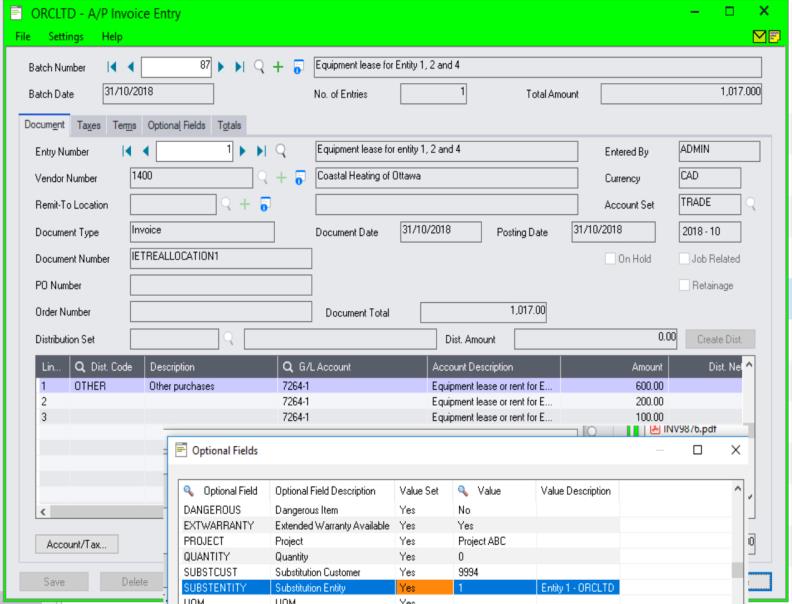
(1) Resulting G/L Batch
The Substitution optional field flows through to the General Ledger transaction.
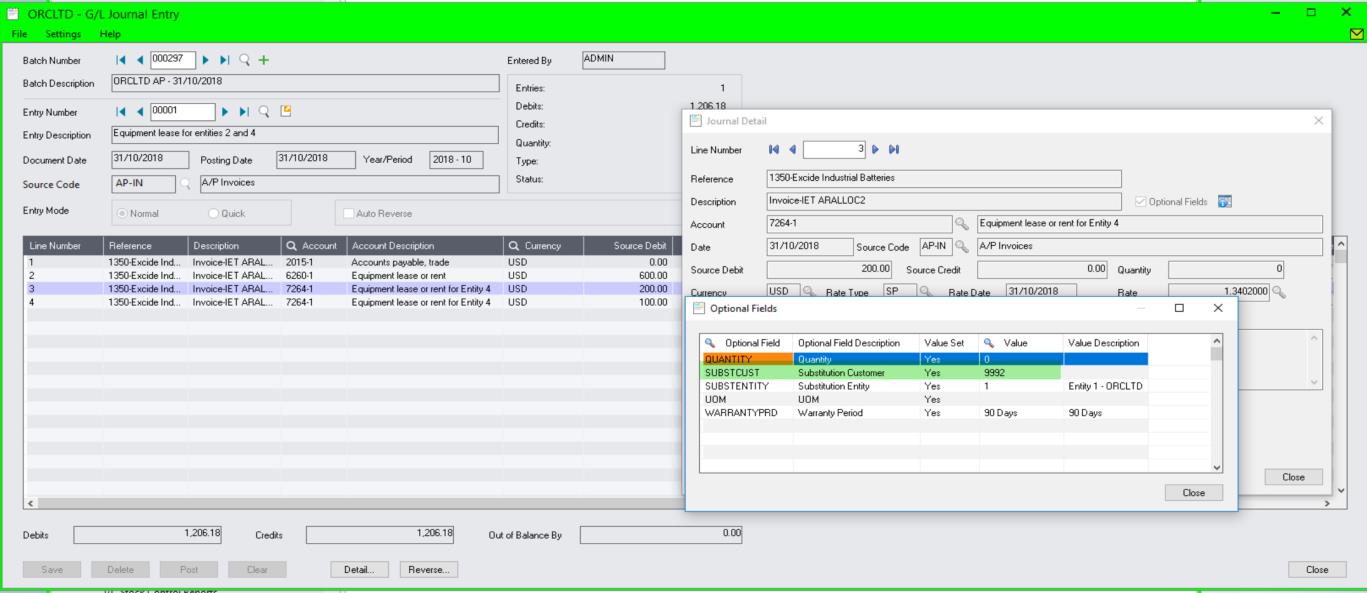
(2) A/R Invoice created when G/L Batch is posted because 7264-1 has been specified as a trigger account, A/R Reallocation
A/R Invoice batch has 2 entries, one for customer 9992, one for customer 9994.
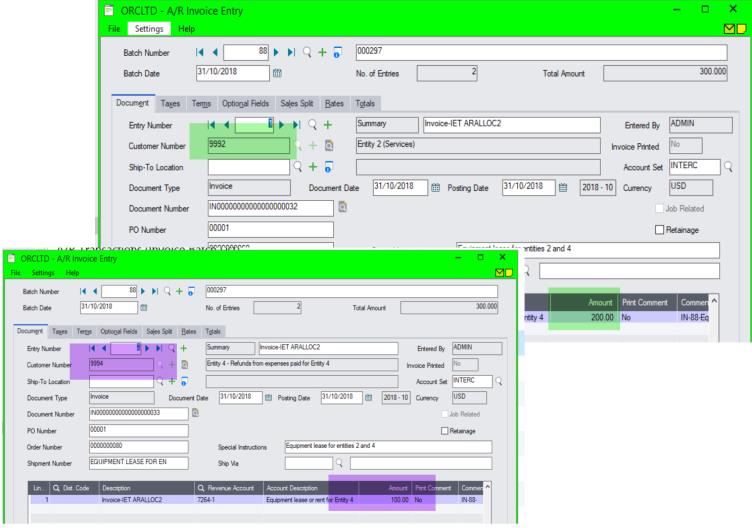
Check IET Triggers Audit Log
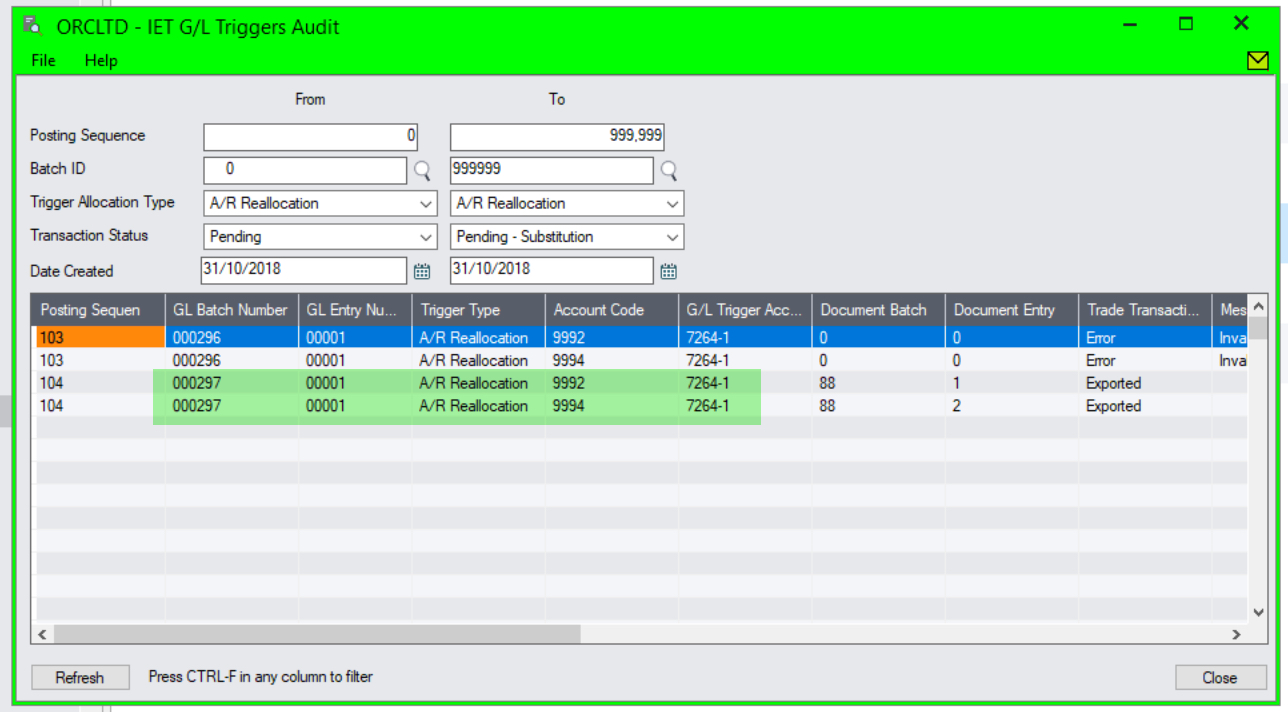
Using G/L Triggers with Inter-Entity Trade
Tip: You can use IET Trade to create an A/P Invoice in Entity 2 and 4 when the A/R Invoice batch is posted.
If using Inter-Entity Trade, the A/R Entry created in the source company by IET Trigger can result in a corresponding A/P entry in the target company.
If the A/R Customer used in the A/R Reallocation in the source company is mapped using Inter-Entity Trade to an A/P Customer in a target company, then as the A/R Invoice is posted in the source company, Inter-Entity Trade will create a corresponding batch A/P Invoice in the Target Company.
Requirement! This requires Inter-Entity Trade and the Inter-Entity Trade setup required is not included in this tutorial.
